Occasional licences remain a vital permission for many businesses

By Jack Cummins
BACK in September, I examined a whole raft of problems associated with occasional licences – the permission that’s proved a godsend for countless operators during the pandemic, allowing alcohol sales on pavements, garden areas and other outdoor spaces.
Although we now seem to be returning to some sort of normality after 19 months of misery, occasional licences will continue to remain a vital permission for many businesses as they have been for many decades.
At the time of my last article, I was awaiting the release of a landmark judgment from Glasgow Sheriff Court going to the heart of various troublesome issues – and that’s now landed.
Last summer, Keasim Limited applied for a series of licences to cover a vacant city centre site for some 14 weeks. There was a positive, trouble-free history: a series of occasional licences had been issued in 2020 – but this time the licensing board wasn’t happy with the proposal.
After a lengthy hearing, the applications were rejected on the basis that they were inconsistent with two licensing objectives: preventing public nuisance and securing public safety. In the reasons for the decision, the board said that Keasim’s proposal did not amount to “occasional use” for a one-off event, also remarking that the application did not require building standards certification (as would be required for a ‘full licence’).
Just to be clear, the board’s decision did not represent hostility to the licensing of outdoor areas during the pandemic. In fact, to its considerable credit, it took a very positive and pragmatic approach in support of the trade’s attempts to sustain some sort of economic viability during a period of unprecedented disruption.
The situation here was quite different, of course: Keasim sought to licence pop-up premises not associated with existing licensed premises.
Keasim’s challenge is the first of its kind under the Licensing (Scotland) Act 2005 – for simple reasons. Occasional licences are frequently used for short-term purposes; and, quite apart from substantial costs, getting an appeal successfully determined in time to make use of the facility poses a real challenge. But with over three months’ trading at stake, Keasim forged ahead and was fortunate to obtain an early decision.
This case is very important because it goes to the heart of long-standing issues surrounding occasional licences. As I explained in the last article, under the former legislation these licences were tied to an “event” taking place outwith licensed premises – a wedding reception, birthday party, etc.
But the Licensing (Scotland) Act 2005 imposes no such requirement. So, could the board expect an applicant to demonstrate that it was required “for a special event to be catered for on unlicensed premises, with the exception of occasional licence applications in respect of outdoor areas associated with licensed premises”? And was the board entitled to decide that a series of consecutive licences extending over a lengthy period bypassed the ‘full licence’ procedure by avoiding wider consultation and, as the Sheriff put it, “more intense scrutiny”?
The Sheriff ruled in favour of Keasim.
There was no requirement for a special event. Occasional licences need not be associated with existing licensed premises. The availability of the city centre site (pending the start of a residential development) could amount to an “occasion”. It was also significant that Scottish ministers had been given powers to introduce an “occasional licence limit” but so far had chosen not to do so.
In effect, the Glasgow board had unilaterally imposed a limit without any authority: it could only refuse an application on one of the grounds specified in the 2005 Act. There was no evidence pointing to the potential for alcohol-related public nuisance or a threat to public safety.
There’s a real chance that the weighty issues raised by this case will impel the Scottish Government to revisit the introduction of curbs on extended use of occasional licences. The ground has already been laid in a consultation exercise carried out in 2019 which reflected concerns – not unique to the Glasgow board – that consecutive occasional licences could “circumvent parts of the licensing regime”.























